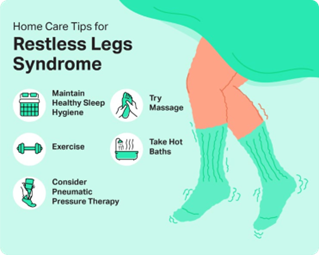An older adult client with restless legs syndrome begins taking melatonin at bedtime. When evaluating the effectiveness of the herb which client assessment should the nurse complete?
Assess anxiety level.
Observe for peripheral edema.
Determine sleep patterns.
Palpate pedal pulse volume.
The Correct Answer is C
Restless legs syndrome is a condition that causes an uncomfortable sensation in the legs and an uncontrollable urge to move them. Melatonin is a natural hormone that helps regulate the sleep-wake cycle and can be used as a sleep aid. Therefore, when evaluating the effectiveness of melatonin in an older adult client with restless legs syndrome, the nurse should assess the client's sleep patterns to determine if the herb is improving their ability to fall and stay asleep.
Assessing anxiety level (a) may be useful in other contexts, but it is not directly relevant to evaluating the effectiveness of melatonin for restless legs syndrome. Observing for peripheral edema (b) and palpating pedal pulse volume (d) are important assessments in clients with peripheral vascular disease or other circulatory disorders, but they are not directly related to restless legs syndrome or the use of melatonin.

Nursing Test Bank
Naxlex Comprehensive Predictor Exams
Related Questions
Correct Answer is A
Explanation
Misoprostol should not be used during pregnancy as it can cause harm to the fetus. Women of childbearing potential should use effective contraception while taking misoprostol. If there is a chance of conception, the healthcare provider should be contacted immediately. A negative pregnancy test is required before starting therapy with misoprostol .

Correct Answer is C
Explanation
The correct answer is C. Liver function lab results.
Choice A: Weight change in the last month
Weight change is a relevant factor to monitor in patients starting on antidepressants, including duloxetine, as some antidepressants can cause weight gain or loss. However, it is not the most critical information to obtain initially. Monitoring weight can help manage potential side effects and ensure the patient’s overall health, but it does not directly impact the immediate safety and efficacy of starting duloxetine.
Choice B: Recent use of other antidepressants
Recent use of other antidepressants is crucial information because combining duloxetine with other antidepressants, especially MAOIs (Monoamine Oxidase Inhibitors), can lead to serious interactions such as serotonin syndrome. This condition can be life-threatening and requires careful management. However, while this information is important, it is not as immediately critical as liver function tests when starting duloxetine.
Choice C: Liver function lab results
Liver function lab results are the most important information for the nurse to obtain. Duloxetine is metabolized in the liver, and patients with pre-existing liver conditions or impaired liver function are at higher risk for hepatotoxicity. Monitoring liver function is essential to prevent severe liver damage, which can be life-threatening. Baseline liver function tests help ensure that the patient can safely metabolize the medication and identify any potential issues early.
Choice D: Family history of mental illness
Family history of mental illness can provide valuable context for understanding the patient’s condition and potential genetic predispositions. It can also help in tailoring the treatment plan and anticipating the patient’s response to medication. However, while this information is useful for long-term management, it is not as immediately critical as liver function tests when initiating duloxetine therapy.
Whether you are a student looking to ace your exams or a practicing nurse seeking to enhance your expertise , our nursing education contents will empower you with the confidence and competence to make a difference in the lives of patients and become a respected leader in the healthcare field.
Visit Naxlex, invest in your future and unlock endless possibilities with our unparalleled nursing education contents today
Report Wrong Answer on the Current Question
Do you disagree with the answer? If yes, what is your expected answer? Explain.
Kindly be descriptive with the issue you are facing.
